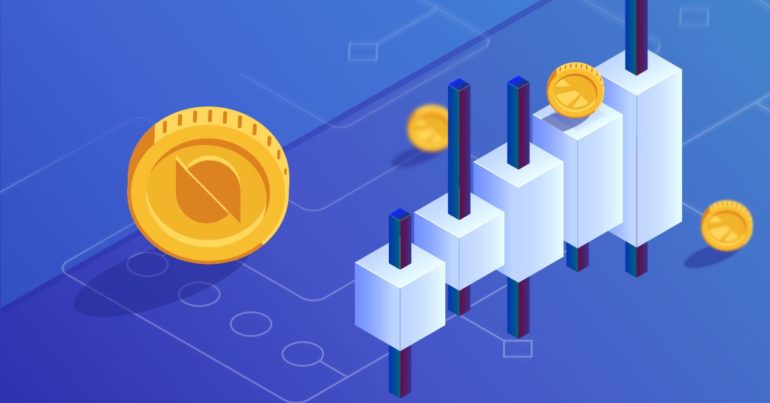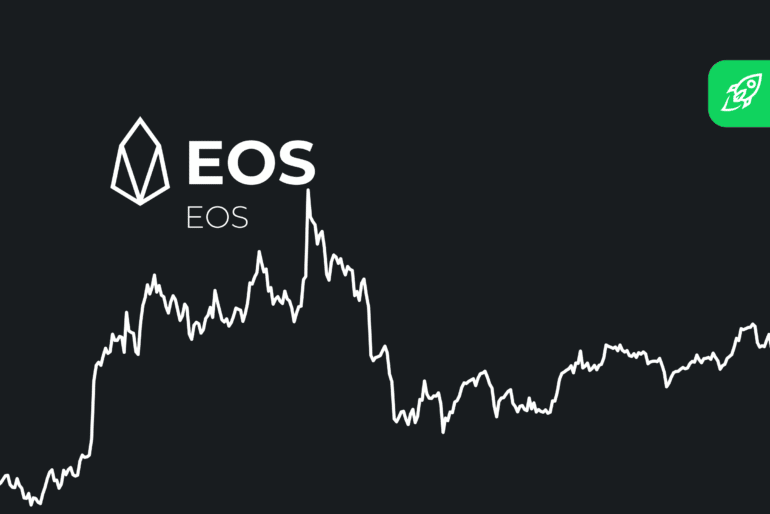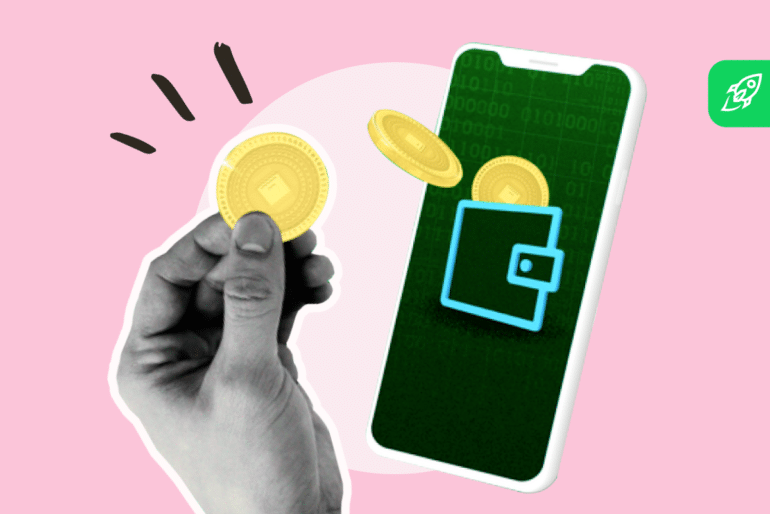EOS (EOS) Price
$0.08479 0.45%
Latest Updates
Updated at 14:34Market cap
$0
Market rank
#4193
Volume 24H
$131,189.08 37.05%
Price change 24h
-$0.00038 0.45%
Price change 7d
+$0.00278 3.28%
What about EOS?
EOS is one of Ethereum’s earliest competitors. In 2017, EOS developers raised more than $4 million in a year-long ICO. Conceived by an organization known under the name block.one, the project was designed to create and run dApps on a blockchain. Interesting fact: block.one doesn’t manage EOS — it just steers the project’s development. What’s more?
EOS uses delegated proof of stake as its consensus algorithm. So, users can stake their tokens after becoming validators, which, obviously, brings additional profits.
Initially, the project developers aimed to solve Ethereum’s scalability problem. EOS can process about 4.000 transactions per second with an average confirmation time of 0.5 seconds.
Nobody knows what exactly “EOS” stands for. The creators decided to keep this secret forever.
EOS is all about smart contracts. The project intends to bring together programmable architectures and versatile blockchain infrastructures for the highest-ever blockchain performance.
Buy EOS Without Any Hassle

EOS Network (EOS) Overview
The EOS Public Network (EOS) is blockchain technology that employs the Delegated Proof of Stake (DPoS) consensus mechanism that is built on the open-source software framework of EOSIO.
In the DPoS system, EOS token holders delegate their coins to elect representatives responsible for validating transactions. Such a system helps to prevent consolidation, where smaller miners are driven out by those with greater computing power and resources.
EOS enables individuals and institutions to develop and engage with diverse decentralized applications (Dapps) and smart contracts. While Block.one (the project’s development team) contributes to the governance of the EOS Public Network, it remains independent of any singular entity and instead relies on the cooperative community of digital asset holders for guidance.
EOS is a cryptocurrency that serves as the native token of the EOS Network. The EOS token plays several essential roles within the network.
It acts as a utility token, allowing users to participate in the EOS ecosystem by staking or transferring tokens.
The EOS crypto also serves as a resource for developers and users, as they can utilize EOS tokens to gain computational power, network bandwidth, and storage capacity for their Dapps.
Finally, EOS token holders have governance rights, enabling them to vote for block producers who maintain the network's security and integrity.
How Do EOSIO and EOS Relate to Each Other?
EOSIO and EOS are integral components of the same ecosystem but serve distinct purposes:
The EOSIO Blockchain, developed by Block one, is a highly efficient, open-source blockchain platform designed to facilitate secure and predictable digital infrastructures. It caters to both public networks like EOS, Telos, and WAX, as well as private networks.
The EOS Public Network operates independently as a blockchain network functioning on Delegated Proof-of-Stake. It uses the EOSIO software framework and serves as one among various open-source networks built on EOSIO.
The EOS Public Network empowers individuals and organizations to create and access diverse decentralized applications and ecosystems. Its governance relies on a cooperative community of digital asset holders, avoiding central control by any single entity.
View the live price of EOS on the interactive chart above. Read our EOS price prediction to gain valuable insights into how the EOS Network coin might behave in the cryptocurrency market in the future.
How Does EOS Work?
EOS operates on a Delegated Proof of Stake (DPoS) consensus mechanism. While anyone can validate the EOS ledger, only selected entities called Block Producers (BPs) can create blocks and determine the official blockchain.
Unlike classic PoS systems, the validating entities don't need to lock up tokens. Instead, token holders delegate their tokens to their preferred BP candidates. The top 21 candidates with the highest delegated token stake become the active block producers. Token holders can change their delegations, causing the active BPs to change within minutes. EOS block producers maintain their privileges as long as token holders trust them to fulfill their responsibilities.
The Antelope Protocol
The EOS blockchain also relies on the Antelope protocol. Antelope is developed and funded by the EOS Network and its engineers, along with collaboration from other members of the Antelope Coalition, including Telos, UX, and WAX blockchains.
Antelope is an open-source blockchain platform designed for secure and reliable digital infrastructures. It supports both public networks like EOS, Telos, and WAX, as well as private networks. Antelope's speed, adaptability, and forward-thinking approach empower developers, entrepreneurs, and institutions to confidently pursue innovation.
What Makes the EOS Blockchain Unique?
EOS is an innovative blockchain system focusing on high performance, flexibility, security, and developer experience. It comes with several distinct features that set it apart from other distributed ledger technologies:
Third-Generation Layer 1 Blockchain
The EOS platform is a third-generation blockchain that aims to overcome scalability issues by utilizing a delegated proof-of-stake (DPoS) consensus model. It offers faster transaction processing and high throughput.
EOS Virtual Machine (EVM)
EOS has its own virtual machine called EOS VM, which is compatible with the Ethereum Virtual Machine (EVM). EOS VM allows developers to create custom smart contracts in multiple programming languages and deploy them on the EOS blockchain.
The virtual machine is it easy to use, and it also offers multiple tools and educational guides to help developers with different levels of experience to learn how to use it to its full potential.
WebAssembly Engine
EOS features WebAssembly (WASM) technology for deterministic execution of near fee-less transactions. A WebAssembly engine is a software component that executes WebAssembly code. WebAssembly is a low-level programming language designed for efficient and secure execution in web browsers, but it can also be used outside of web environments.
The engine interprets and executes WebAssembly instructions, providing a runtime environment for running applications written in WebAssembly. As for EOS, the WebAssembly engine is used to execute transactions in a deterministic manner, ensuring consistent results, and allowing for near-zero-fee transactions on the EOS blockchain.
Decentralized Operating System Governed by DAO
The EOS Network functions as a decentralized operating system run by a Decentralized Autonomous Organization (DAO). This means that decision-making processes and network maintenance are determined by the EOS community through voting.
Community-Led Foundation and User Support
EOS is one of the first blockchain projects with a community-led foundation and user support, where token holders elected a foundation to spearhead network growth. This feature of EOS opens up a wide range of potential use cases, from creating custom smart contracts to developing versatile blockchain infrastructures.
What is the EOS Token?
The EOS blockchain is a fast and infinitely scalable smart contract platform that can handle over 10k EOS transactions per second without direct fees. EOS relies on a Delegated Proof of Stake (DPoS) model, where stakeholders are allowed to select node operators. This decentralized nature of token distribution ensures that power doesn't reside solely in the hands of block miners, but is shared among all parties involved in the EOS Network.
The EOS token serves as a medium of exchange within the EOS ecosystem of decentralized applications (Dapps) and smart contracts. It allows users to transact on DeFi protocols, buy and sell NFTs, play GameFi platforms, and engage in various digital activities with no a central authority.
EOS token holders can shape the future of Web3 by participating in the governance of the EOS Network. They can vote for network validators and contribute to the allocation of network resources.
Apart from its utility within the ecosystem, EOS is also used to purchase or rent network bandwidth and storage capacity. This enables users to perform operations, such as token transfers and interact with EOS Dapps and smart contracts.
You can buy and sell EOS coins through popular crypto exchanges, including Changelly. EOS token holders should store their tokens in secure wallets such as Anchor, Wombat, or TokenPocket to ensure the safety of their funds.
New EOS coins are created through a process called block production, where block producers validate and add new transactions to the blockchain. As a reward for their efforts, block producers receive newly minted EOS coins.
For those curious about how many EOS coins are there in circulation, the EOS coin has a 3% rate of inflation with no limited max supply and a current circulating supply of 1.08B.
The current price of EOS with the latest market statistics and price history of the EOS cryptocurrency is available through the price chart above. Use it to keep track of EOS’ performance at the crypto market and empower your investment decisions.
What is The EOS Network Foundation (ENF)?
The EOS Foundation is a not-for-profit organization launched by Yves La Rose and operated by the community. It coordinates financial and non-financial support to facilitate the growth and development of the EOS Network.
The EOS Network Foundation supports the growth and adoption of EOS by providing funding through grants, working groups, and product development. This fosters a positive environment where projects and products are backed to enhance EOS as the leading blockchain ecosystem.
What is The EOS Ecosystem?
The EOS virtual machine has facilitated the creation of multiple decentralized applications, crypto wallets, DeFi (decentralized finance) solutions, and other integrations.
EOS EVM enables Dapp development like "Everipedia," a decentralized encyclopedia allowing transparent content contribution and curation.
The EOS ecosystem supports crypto wallets like "Anchor," enabling secure storage, management, and transactions of EOS tokens and assets.
EOS hosts DeFi platforms like "Defibox" for decentralized exchanges, lending protocols, and stablecoin issuance.
EOS EVM integrates with external platforms like "LiquidApps," providing scalable decentralized infrastructure solutions through DAPP Network for enhanced Dapp functionality.
A vibrant EOS ecosystem can positively influence the EOS price by fueling the demand for the token. This can happen through increased usage of EOS-based applications, attracting more users, developers, and investors to participate in the ecosystem, ultimately driving up the demand for the EOS coin and potentially impacting the price.
See the current EOS price above.
Who Created EOS?
The EOS Network was launched in 2018 by Block one, a blockchain software company founded by Daniel Larimer, who is a software developer and entrepreneur, and Brendan Blumer, who is a serial entrepreneur with a background in technology and finance.
EOS aims to address issues faced by other blockchains, such as badly scalable decentralized applications (Dapps) and high transaction fees.
Block one ran an ICO (Initial Coin Offering) that took place from June 2017 to June 2018 and it was one of the largest ICOs in the crypto market history, raising over $4 billion. The token sale involved the distribution of ERC-20 tokens called EOS tokens.
In June 2018, the EOS blockchain was officially launched by a decentralized group of block producers, who initiated the network using a token distribution snapshot from Block one's ICO. This marked the beginning of the EOS blockchain's operation and its transition from the ICO phase to a live blockchain network.
View the EOS price history on the chart above. It shows the current price of EOS, along with the all-time low and all-time high price points of the EOS Network cryptocurrency. For example, the highest price paid for EOS is $22.89, while the lowest price paid for EOS is $0.48. The average price at which the EOS coin is traded today is $0.70.
What Is the Price of EOS Today?
Changelly provides an interactive EOS chart reflecting the live EOS Network-USD price with real-time updates and detailed market statistics. Our EOS price chart includes the latest data, such as the market cap of EOS, its trading volume, and recent price changes.
Our EOS prediction offers insights into future performance based on EOS price analysis. However, our EOS forecast is not guaranteed because of extreme crypto market volatility and various factors affecting crypto prices. These include market sentiment, regulatory changes, technological advancements to the EOS platform, and more. Conduct thorough research and technical analysis of the crypto before you buy EOS.
Along with offering the live EOS price statistics, our crypto exchange platform also facilitates effortless EOS coin swaps and purchases with a fiat currency.
This text is for informational purposes only and doesn't provide investment advice. Conduct your own analysis and consult a professional financial advisor for weighted investment choices.
Trending
24h top price changes+$0.05499 105.21%
+$0.02983 30.72%
+$0.00163 26.03%
+$0.03596 21.95%
+$0.00819 21.27%
+$0.00556 18.92%
+$0.00954 18.74%
+$0.06659 17.17%
+$0.00105 16.91%
+$0.03056 15.99%
FAQ
What determines the price of EOS?
What was the starting price of EOS?
What was the highest price of EOS?
What was the lowest price of EOS?
Related articles about EOS
Subscribe to our newsletter to get the latest crypto insights and price updates.


